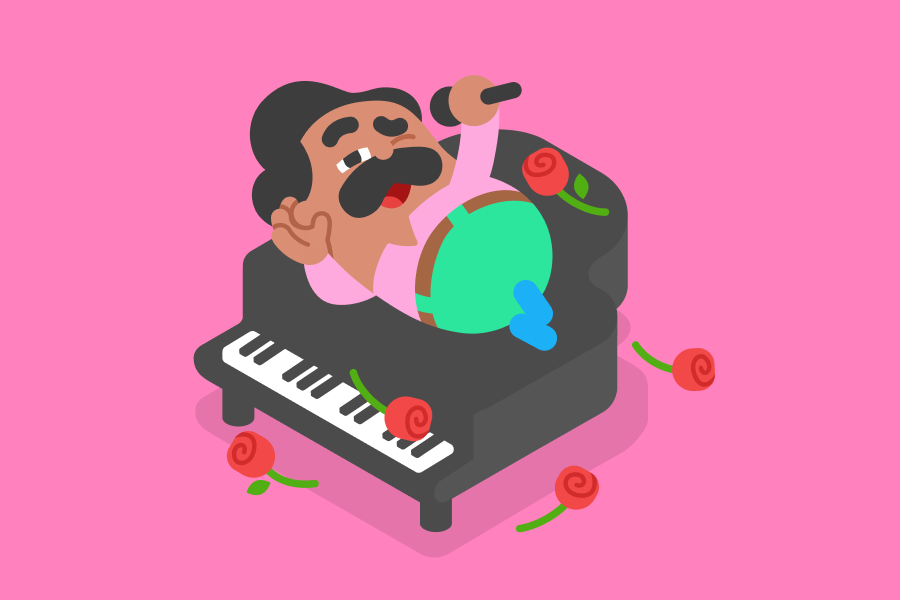Eurovision has become increasingly popular around the world, but did you know that the idea was born in a small seaside city in northwestern Italy?
The Festival di Sanremo (Sanremo Music Festival) has showcased music and artists who would later take their place on the world stage at Eurovision and beyond: 2021 Festival champion (and 2021 Eurovision winner) Måneskin and the song Volare, to name just two.
How did a small Italian radio program in the early 1950s get the whole world singing—and competing?
Sanremo and how Italy got all of Europe singing
February in Italy signals the Festival di Sanremo, a 5-day event from the region you know for pesto, focaccia, and Cinque Terre. All of Italy keeps sul pezzo (up to date) on every detail of the show, its hosts, contestants, and guests.
The first few editions of Sanremo were transmitted by radio—until 1955, when the Italian public broadcasting company was able to transmit the Festival across western Europe with new technology called Eurovision. (Sound familiar?)
Through the years, Sanremo has reflected the evolution of Italian society and musical tastes, from traditional canzoni d'amore (love songs) dominating its early years to pop, multicultural, and international performances in recent years.
Despite the shift in musical trends, Italians still love the Festival because, as an old jingle goes, Sanremo è Sanremo (Sanremo is Sanremo)!
Non solo canzonette—not just about the songs!
Sanremo reflects the trends, politics, and events of the moment, including issues of gender and immigration—even though some would argue that sono solo canzonette (they are only lighthearted songs). For example, the Festival has been criticized for the underrepresentation of women artists. Men dominate talent scouting for record labels, leading to a majority of male artists brought to the forefront. The last vincitrice (female winner) was in 2014, and in 2023, no women made the top 5.
The Festival has also addressed l'immigrazione (immigration). In 2019, the Festival's artistic director and presenter made comments about the way the immigration crisis was being handled by the government, sparking a lively debate nationwide. When Mahmood, a singer of Egyptian descent, won with Soldi (Money), a song with an urban beat and partially in Arabic, politicians leveraged his victory for their anti-immigration agendas.
And in 2023, a letter from Ukrainian President Zelenskyy stirred debate about the Festival's role as purely entertainment or a platform for social and moral issues. Despite differing opinions, the passionate discussions surrounding the Festival's political conversations have become an annual ritual, uniting Italians: O si odia o si ama, ma tutti ne parlano (Whether it's hated or loved, everyone talks about it)!
Italian lessons in Sanremo songs
Recent songs that have competed in the Festival represent a wide variety of themes, styles, and even languages that showcase today's Italy.
Mahmood has been an exciting new artist who has introduced new music styles to the Sanremo audience. His 2019 winning song Soldi (Money) included both Arabic and Italian:
| Italian | Translation |
|---|---|
| Waladi waladi habibi ta'aleena Mi dicevi giocando giocando con aria fiera Waladi waladi habibi sembrava vera La voglia, la voglia di tornare come prima |
My son, my son, my love, come here You used to say playing, playing with a proud air My son, my son, my love it seemed true The longing, the longing to return to how it was before |
Mahmood won the Festival a second time in 2022 and will be competing again in 2024! His first win was a duet with Blanco, a very young musician who had just published his first album in 2021, with a song called Brividi (Shivers)—a great way for learners to practice conditional verbs!
| Italian | Translation |
|---|---|
| E ti vorrei amare, ma sbaglio sempre E ti vorrei rubare un cielo di perle E pagherei per andar via Accetterei anche una bugia |
And I would like to love you, but I always make mistakes And I would like to steal you a sky made of pearls And I would pay to go away I would even accept a lie |
In 2021, the duo Colapesce and Dimartino performed a song titled Musica Leggerissima (Very light music), which describes some traits of musica leggera, a type of pop music with easy to understand lyrics, catchy tunes, and meant purely for entertainment. This quickly became a tormentone, a hit song played everywhere!
| Italian | Translation |
|---|---|
| Metti un po' di musica leggera Perché ho voglia di niente Anzi leggerissima Parole senza mistero Allegre, ma non troppo |
Put on some light music Because I don’t feel like anything Actually, very light Words without mystery Cheerful, but not too much |
The same year, the now world-wide famous band Måneskin won Sanremo with Zitti e Buoni (Shut Up and Be Good), a song that is everything but musica leggera, and then went on to win Eurovision!
| Italian | Translation |
|---|---|
| E buonasera signore e signori [...] Sono fuori di testa Ma diverso da loro E tu sei fuori di testa Ma diversa da loro |
And good evening ladies and gentlemen [...] I’m out of my mind But different from them And you’re out of your mind But different from them |
Buon divertimento—have fun!
The Sanremo Festival happens each February—so there's still some time to prepare by practicing your Italian on Duolingo! Listen out for familiar words and phrases and you may soon be singing along to the next tormentone.



